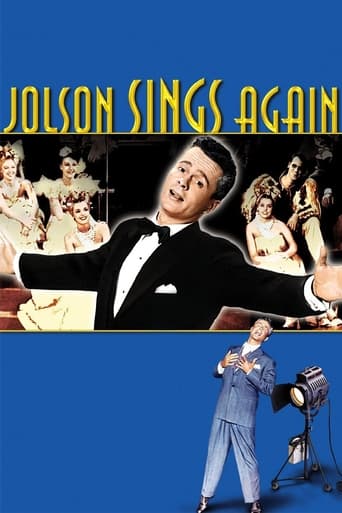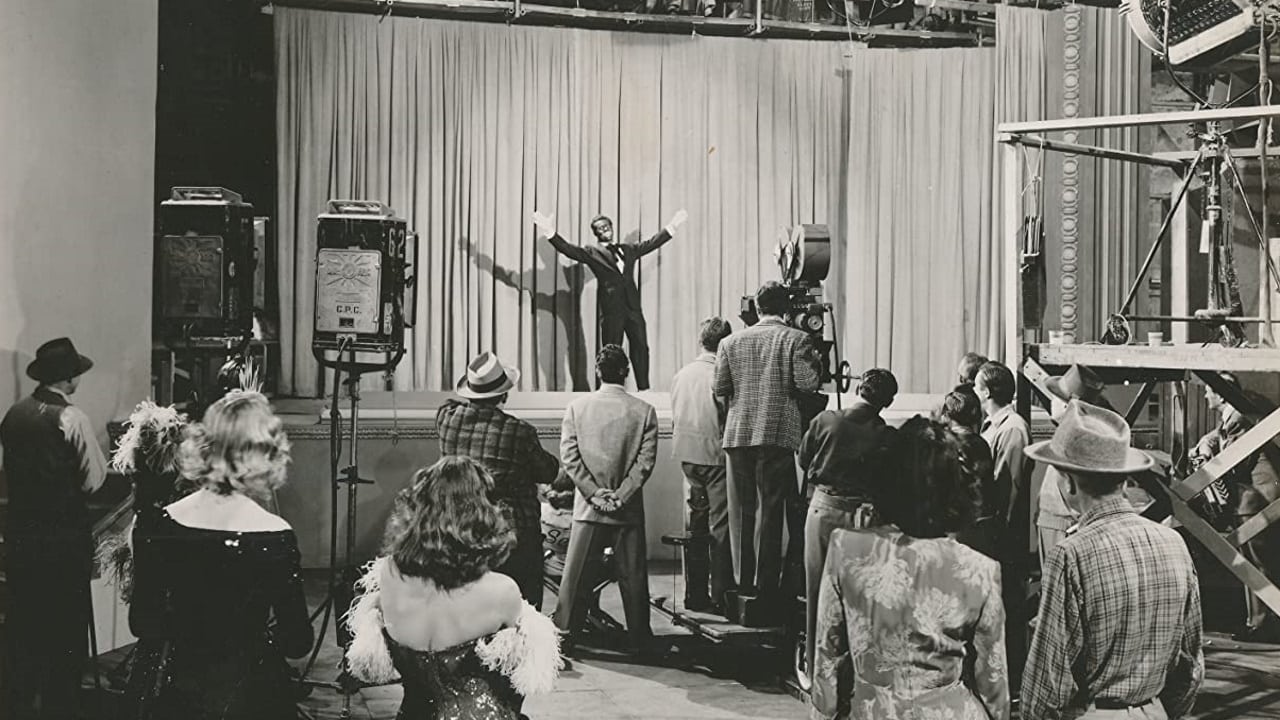OneView
Columbia had scored a significant financial and critical success with The Jolson Story in 1946 featuring actor Larry Parks miming successfully to Al Jolson's singing voice, the ageing entertainer re-recording all his great hits for the film. Then as now thoughts of a sequel were forthcoming but the story of Jolson's career had essentially been told in its entirety. This can be seen in the struggle the screenwriters had in creating a compelling narrative for the second film. The key plot points are fairly anaemic, including the end of one marriage, the gestation of another, a temporary retirement for Jolson and his re-discovery entertaining the troops in World War II. The final third of the film, in almost an act of desperation, is given over to the production of The Jolson Story, resulting in Larry Parks playing Jolson opposite Larry Parks playing himself. This includes one sequence where Parks playing Jolson stands on set urging Parks playing Parks who is in fact playing Jolson to successfully mime to the real Jolson's singing. Possibly the word meta was invented to describe just this kind of scenario.The lack of plot means that the audience is left mostly idling between musical numbers. The actors try hard; Parks in particular is very personable and captures some of the sheer stage presence and energy of the real Jolson. Barbara Hale has a thankless role as Jolson's new wife, mostly sitting admiring the prolonged performance scenes. Ludwig Donath is precise as Jolson's cantor father with concern for his son echoing through every scene even when he is conveying anger. Despite the presence of Technicolor the production looks a little cheap with a lot of fairly basic sets - the cinema foyer looks like a re-dress of something used in another film and the Alaskan army hut is two walls and a backdrop. Many scenes are conveyed through newspaper and other montages and there is never really much conviction to Jolson's international travels.The music is the main drawcard here and the real Jolson provides committed and passionate singing throughout. It is a pity that the surrounding fabric of the film could not better support his work
vincentlynch-moonoi
Don't get me wrong. This is still a good film. Pretty average for a bio-pic, and as with most sequels, it doesn't come up to the level of "The Jolson Story"...but it's still enjoyable and finishes a highly fabricated version of Jolson's life. Little did they know that had they delayed the film a year, they'd have told the Jolson story from start to finish.The best scene of the film is when Jolson returns to Washington after his mother dies, and Jolson and his father have a brief heart-to-heart.It is very true that Jolson became a tireless performance for the USO during World War II, and that is a big part of this picture. In fact, health issues related to his World War II and Korean War performances appear to have figured in his ultimate demise.Larry parks continues his bravura performance as Al Jolson; William Demarest is again along as Jolson's manager, and although not in as many scenes this time around, it's still one of his best roles. Ludwig Donath is back again as Jolson's father, and again, it is a charming performance. Barbara Hale (of Perry Mason fame) is the love interest this time, and she was enjoyable on screen...Arkansas accent and all.It is clever the way they meld the making of "The Jolson Story" within "Jolson Sings Again".It's a decent followup to "The Jolson Story", but not quite as good as that original. It's too bad the film can't bring up the final year of Jolson's life, including his wonderful appearances with Bing Crosby.Sadly, not long after this film was made, Larry Parks got caught up in the Blacklisting with the Red Scare and was only rarely seen after that. I guess the consolation was that his performances in the two Jolson films could probably not have been done better by anyone; truly fine performances that are near iconic.
caa821
This film is unique, as a sequel to the original "biographical" picture three years earlier. Actually, placed in tandem with "The Jolson Story," it begins precisely where the original ends. Together, they present one unified story (as fictionalized as it is) of Jolson from his mid-teens to the period of his rejuvenated career (even besting Crosby and Sinatra as the country's top male vocalist) - when he is now in his 60's, not long before his career was ended by a fatal heart attack, at age 64 (some sources indicate 65). If viewed together, "Jolson Sings Again" comprises with the predecessor a seamless 3-hour 44-minute presentation of this great entertainer's work. As with the original, much is pure fiction in the way it portrays Jolson's persona. This is even affirmed to a degree when Parks indicates to the screen writing team, after it is arranged in this picture to film "The Jolson Story," that they can juggle dates and facts as they like. He indicates his desire simply to show the performer who loved to entertain. A good friend of mine, who is an entertainer, a member of "The Jolson Society," and who has known some who themselves knew Jolson personally - as well as other things I've heard and read - indicated specific variances to this story. Jolson apparently, instead of agreeing reluctantly to have his life story filmed, vigorously pursued this end. He also, with equal vigor, argued that he play himself, and purportedly did not have quite as "warm and fuzzy" relationship with Larry Parks as shown. It is also unbelievable, even "corny," how this man could be as amazed, even confused, by some of the events in the film. He had been singing during his entire life, starred in the first "talking" picture, appeared in several films, and made numerous records - from their earlier times. He was one of the pioneers through numerous innovations over many years years, in both film and records. Yet in the story, he is portrayed as naive, and totally surprised, to see the recording facilities the movie producer has. He exhibits an almost child-like amazement upon being shown the film clip of Parks' miming in-costume his recording of "Toot Toot, Tootsie" -- which the producer and Al's wife had "prodded" him into making. Although still interesting to view in the film, this is the most far-fetched of fiction. One area of the story completely in harmony with real life, though, was depiction of his various tours entertaining armed service personnel. Jolson was admirably every bit as dedicated towards entertaining our military, as shown (actually, perhaps even more so!) - and did so during several conflicts, from the Spanish American to Korean Wars (visiting troops of the latter at his own expense) . The portrayal of his continuing relationship with William Demarest's "Steve Martin" composite/fictional character, and Barbara Hale as his wife (2nd in this story, 4th in real-life) are warm and enjoyable to observe (Demarest's "Steve" is the spriest senior citizen ever, on film or off -- based on the overall time line of the two pictures, he would have been well into his 80's). And like the original, the music in this sequel is outstanding, the performances well-acted,
willrams
The sequel to The Jolson Story with Larry Parks playing himself and meeting Al Jolson for the first time to do this film. Jolson also appears in a long shot of a ramp scene singing Swanee River, but most people didn't know this until years later. The story begins with a Hollywood producer wanting to do the story, and takes up where Jolson's first wife gets a divorce. The movie of his life is a big winner! Later, during WW II, Jolson goes overseas to entertain troops, catches malaria, and while in a hospital falls in love with his nurse; a kind and patient beautiful nurse, played by Barbara Hale. William Demarest plays Jolson's manager and press agent. Ludwig Donath plays cantor again, and momma is played by Tamara Shayne, who lend much humor to the story. Perfect for those who loved Jolson and his music! This production won 3 Oscar nominations for writing, cinematography and musical scoring. I give it 10/10


 AD
AD



